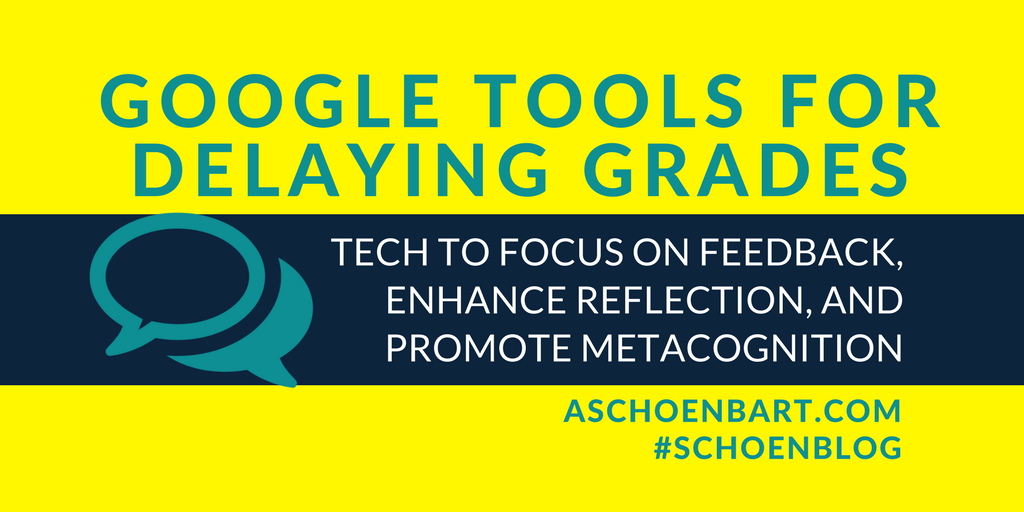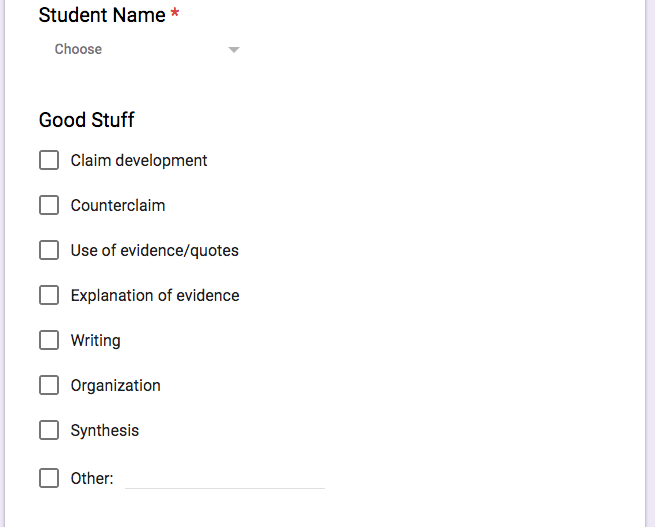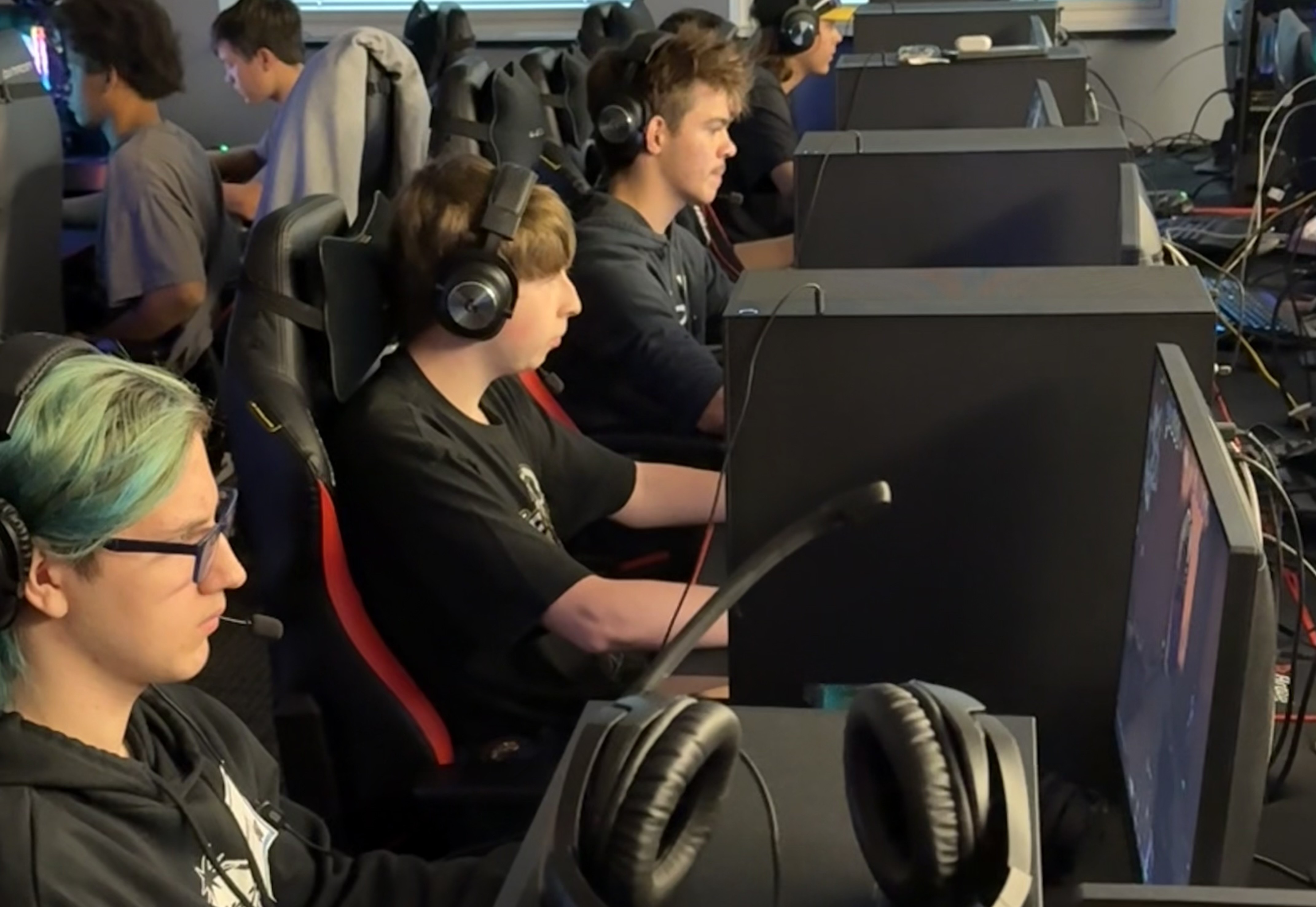Google Tools for Delaying Grades to Focus on Feedback


I’ve seen a lot of discussion lately about the concept of delaying grades based on Kristy Louden’s awesome article, Delaying the Grade: How to Get Students to Read Feedback, over at the equally awesome Cult of Pedagogy.
She argues that if you have students focus on reading feedback and self assessing their work before addressing the grade, the feedback becomes more meaningful. I wholeheartedly agree, and have seen many educators jumping into the conversation with their own practices and strategies. I’ve thought a lot about my own grading and feedback beliefs and policies this year, and done a lot of work to be better.
Louden writes, “Wow, glad I put so much time into that assignment, said no teacher ever.” We spend so long grading and providing feedback, but too often it ends up crumpled in backpacks or garbage cans. Online feedback is great because it’s harder to lose or misplace, but it still can be a struggle to get students to read it. We need to stop doing the same thing and expecting different results. We need to stop the insanity.
Louden explains her methods, continuing, “The simple act of delaying the grade meant that students had to think about their writing. They had to read their own writing—after a few weeks away from it—and digest my comments, which allowed them to better recognize what they did well or not so well. The response from students was extremely positive; they understood the benefit of rereading their essays and paying attention to feedback. One boy said, ‘Mrs. Louden, you’re a genius. I’ve never read what a teacher writes on my essay before, and now I have to.’”
For more on grades and feedback I recommend checking out ”Changing the Conversation: Grades vs. Learning” by Starr Sackstein and ASCD’s Seven Keys to Effective Feedback from Grant Wiggins.
Feedback Conferences
I wish I was better at face-to-face, individual conferences about student work. Louden conferences with her students--and this is fantastic--but it’s never been my strong suit. What I’m really good at is using technology to provide specific, focused, and timely feedback to students. This shouldn’t entirely replace the conference--I wish I did this more often and better--but it can be a nice tool to help make the feedback process easier in delaying grades.
Google Tools to Delay Grades
In addition to delaying the grade, I like to delay the feedback. To do so, I generally return digital or hard copies of student work without any comments. Then, I ask students to read, comment on, and assess their work using a rubric. Usually, I do this a few days or even a week after the writing is turned it--this time creates a separation from the student as the writer versus editor. With distance, my students are often about to be more objective, thoughtful, and constructive about their own work.
Tools and ideas to transform education. Sign up below.
Sometimes, the student’s self-assessment makes it easier for me to provide feedback. I can reference their own comments and thoughts, and learn more about their understanding of their progress. Other times, I want to return my feedback immediately and use it to help them assess their own self-assessment and reflection. To do so, I turn to Google.
Google Classroom: Return with Purpose
Let’s start with the simple option: use Google Classroom to promote self-assessment and feedback and delay the grades. When a student turns work in on Classroom, they lose rights to edit. Use this transfer of sharing rights to have them provide feedback on paper or to add suggested comments about their own writing. Then, return the work to a class or any number of students to share your comments and/or grades.
Looking for more control and specificity in your feedback? Explore Google Forms below and its power to help delay the grade.
Google Forms and formMule
With my students’ most recent work, I created a feedback form to organize and maintain my feedback digitally. I read students’ writing and used this simple form (see below) to provide the feedback. Notice the drop down list of student names and the checkboxes for common feedback items. This makes it quick and easy to make the process effective--the same options repeat with a heading for improvement.

I fill out the form, write comments, and can provide a grade. The submissions live in a Google Sheet, where I set up the add-on formMule to make the return process easy. With formMule, the sheet rows merge to an e-mail, sharing the results when I’m ready to do so. I use a roster of my classes to look up student e-mail addresses based on their names (but there could easily be a form question or drop down for e-mails, too) and then send the feedback only AFTER students have completed their reflections and self assessments. This way, I can delay the grades and the feedback to promote active reflection and metacognition.
If my students are ready, I’ll return all of the feedback at once, but I can also choose to add a send condition in formMule to only send it back to some students. If you’re new to formMule, check out Schoencast 01: formMule for a walkthrough tutorial.
To make feedback and grades matter more to students, and to make them matter to learning, we need more than technology. We need conversations about learning, along with reflection and conversations about growth and metacognition. But technology can help make the process easier and more efficient. Check out the original article that inspired this post, Delaying the Grade: How to Get Students to Read Feedback, and add your best tips--high tech or no tech--and join the conversation.
What are your best strategies for making feedback matter to students? How can technology help (or hurt?) in the process? Please share your thoughts in the comments or on Twitter @MrSchoenbart.
cross posted at www.aschoenbart.com
Adam Schoenbart is a high school English teacher, Google Education Trainer, and EdD candidate in Educational Leadership. He teaches grades 10-12 in a 1:1 Chromebook classroom at Ossining High School in Westchester County, NY and received the 2014 LHRIC Teacher Pioneer Award for innovative uses of technology that change teaching and learning. Read more at The SchoenBlog and connect on Twitter @MrSchoenbart.
